|
Rotten Library > Religion > Bible > The Historical Construction of The Bible > Protestant Christianity -- Reformation of the Bible
Protestant Christianityreformation of the bible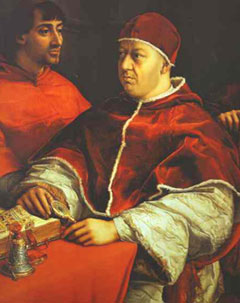 During the centuries succeeding the death and alleged ascension of Jesus, the Christian Faith evolved from small groups of faithful awaiting the end times and second coming -- surely due any day -- to a vast yet highly organized and orthodox religious bureaucracy that ministered to the massive populations of the faithful on multiple continents. Not surprisingly, a great deal of ritual and doctrine was accreted during this time that had not existed in the early years of the Church.
During the centuries succeeding the death and alleged ascension of Jesus, the Christian Faith evolved from small groups of faithful awaiting the end times and second coming -- surely due any day -- to a vast yet highly organized and orthodox religious bureaucracy that ministered to the massive populations of the faithful on multiple continents. Not surprisingly, a great deal of ritual and doctrine was accreted during this time that had not existed in the early years of the Church.
One such accreted doctrine was the absolute infallibility of the Pope and his absolute power over the entirety of the clergy and the laity. This was the primary doctrine that split the Eastern and Western Churches into the completely independent entities now known as the Roman Catholic Church and the Eastern Orthodox Church. In reference to this absolute power, Pope Innocent III (1198-1216) wrote: "We may according to the fullness of our power, dispose of the law and dispense above the law. Those whom the Pope of Rome doth separate, it is not a man that separates them but God. For the Pope holdeth place on earth, not simply of a man but of the true God." And Pope Nicholas I (858-867) declared, "the appellation of God had been confirmed by Constantine on the Pope, who being God, cannot be judged by man."
Pope Leo X (1475-1521), who is alleged to have said "the fable of Christ has been quite profitable to us", was so fond of throwing himself extravagant parties that he emptied the Vatican's treasury. Not a man to be easily thwarted, he funded his spending habits by taking out enormous loans (on behalf of the Church) at 40% interest. As the Church, and the papacy, sank further into debt, he began selling church offices -- that is, appointing to high office anyone willing to pay lavishly for the privilege. He is also credited with inventing the selling of "indulgences".
By the 14th century, such unholy goings-on (plus some vicious self-serving politics) led to mounting unrest and attempts, both secular and religious, to throw off the papal yoke. One such effort was John Wycliffe's 1380 translation of the Latin Vulgate Bible into English. Not only did he dare to retranslate the Holy Word on his own, without papal permission, but he also made dozens of copies of his illegal manuscript that they might be distributed (and further copied) among the laity.
The irony here is that when the Church's official text, the Latin Vulgate, was first created by St. Jerome (sometime in the late 4th century), it was intended to serve as translation for the people. That is, Jerome had translated the texts from the original Greek and Hebrew into the language of the common folk of Rome and the Empire: Latin. But 1000 years later, the Roman Empire was no more. Italian had replaced Latin as the common tongue in Rome, and Latin was now taught only to scholars and the clergy. Saint Jerome and his contemporaries would surely have endorsed the creation of English language Bibles -- or German language, or French or any other language spoken by the faithful or by potential converts.
Furthermore, even those who could read and understand the text of the Vulgate were being led astray. 14th-16th century critics of the Late Vulgate version claimed that it twisted the actual meaning of the scriptures, both Old and New Testament. One such critic was Thomas Linacre, an Oxford scholar who had traveled all the way to Italy to learn Greek. Upon reading Greek language manuscripts of the New Testament for himself, Linacre proclaimed, "Either this is not the Gospel... or we are not Christians." So great a departure was the Vulgate from the earlier copies of the New Testament that Linacre felt the Catholic Church was teaching some other religion entirely, one not reflective of the true message of Christ.
But such dealings only served to further damn the Church in the eyes of those who favored the free exchange of knowledge and the free exercise of reason. In 1517, fed up with the Church's doctrines and abuses, an obstreperous and determined German scholar named Martin Luther publicly declared the flaws in their theology by nailing his famed 95 Theses of Contention to the door of the Wittenberg Church. Luther had read for himself Hebrew manuscripts of the (Old Testament) Bible. And he was aware that several texts included in the Latin Vulgate version were not counted as authentic scripture according to the Hebrew Bible ratified at the Council of Jamnia. Most significantly, it was from these very texts, of spurious nature, that the Catholic Church drew justification for its very lucrative doctrines of purgatory, sin, and the purchase of indulgences. In Luther's view, the Roman Catholic Church was utilizing bogus scriptures to line its own pockets. More importantly, these bogus scriptures conflicted with the very message of the Gospel -- that those who have faith in Christ are saved.
Luther's bold stance soon drew to his side another disgruntled religious scholar and reformer, William Tyndale. Head of the reform movement in England, Tyndale had fled to Germany to escape capture (and execution) while working on his own English language version of the New Testament. Most significantly, Tyndale's association with Luther meant that he (unlike Wycliffe) had access to a printing press. Thus he could produce not dozens of books, but hundreds. After binding, the books were smuggled back to England in sacks of flour and so on, where many were confiscated and burned. Anyone found in possession of the book was also burned. However, Tyndale merely continued to print more books, and smugglers continued to supply them to England. Eventually, in 1536, Tyndale was betrayed, captured and executed. But his work was carried on by Myles Coverdale and John Rogers -- and scores of others who wittingly or unwittingly smuggled the heretical books into England. Had Tyndale lived but three more years, he would have witnessed an unbelievable reversal of fortunes. In 1539 King Henry VIII, replacing the Roman Catholic Church with his own newly-formed Anglican Church, found himself in need of the very thing that he had killed Tyndale to suppress: hundreds and hundreds of English language Bibles. Henry's bold, albeit selfish move (he was pissed off at the Church for controlling his sex life and matrimonial schemes), would prove to be a significant turning point in the development of English language Bibles as well as in the power held by the Roman Catholic Church.
|
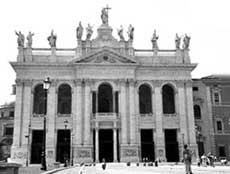 Naturally, to be God on Earth is to wield a great deal of (political) power. And the aphorism "absolute power corrupts absolutely" was certainly not disproved by the office of Pope. Under the protection of their office, popes and their lesser brethren committed scandalous acts of hypocrisy, debauchery, and ruthless political maneuvering.
Naturally, to be God on Earth is to wield a great deal of (political) power. And the aphorism "absolute power corrupts absolutely" was certainly not disproved by the office of Pope. Under the protection of their office, popes and their lesser brethren committed scandalous acts of hypocrisy, debauchery, and ruthless political maneuvering. 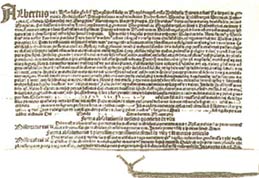
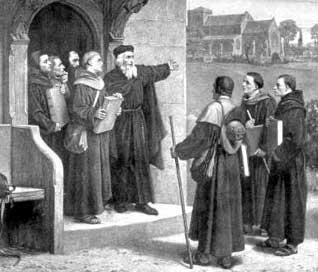 Wycliffe's radical actions threatened the spiritual and political power of the Church, introducing the possibility that laypersons could now read and interpret the scripture for themselves. Naturally, this meant they could bypass the indoctrinations of the Catholic Church, including all the accreted traditions and doctrines that helped reinforce its power and the power of the supporting priesthood. As a result, Wycliffe's translation (and the doctrines of his teachings) so enraged the Church that 44 years after his death, the Pope ordered his bones dug up, crushed, and thrown in the river.
Wycliffe's radical actions threatened the spiritual and political power of the Church, introducing the possibility that laypersons could now read and interpret the scripture for themselves. Naturally, this meant they could bypass the indoctrinations of the Catholic Church, including all the accreted traditions and doctrines that helped reinforce its power and the power of the supporting priesthood. As a result, Wycliffe's translation (and the doctrines of his teachings) so enraged the Church that 44 years after his death, the Pope ordered his bones dug up, crushed, and thrown in the river.
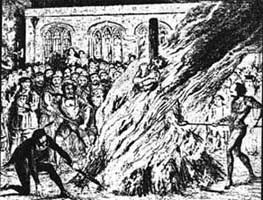 But the Catholic Church had changed much in the thousand years since Saint Jerome. The goal of the Church was no longer to disseminate the written Gospel, but to jealously hoard it and to ensure that the ideas it offered were carefully interpreted by its own agents, to its own advantage. Meanwhile, by presenting the Bible, and the service of Mass, only in the now antiquated language of Latin, the Church excluded everyone but wealthy, well-educated city dwellers from knowledge of the Gospel.
But the Catholic Church had changed much in the thousand years since Saint Jerome. The goal of the Church was no longer to disseminate the written Gospel, but to jealously hoard it and to ensure that the ideas it offered were carefully interpreted by its own agents, to its own advantage. Meanwhile, by presenting the Bible, and the service of Mass, only in the now antiquated language of Latin, the Church excluded everyone but wealthy, well-educated city dwellers from knowledge of the Gospel.
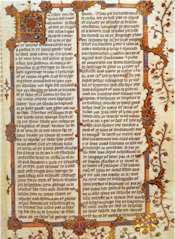 Meanwhile, the Catholic Church had much at stake in controlling access to the scripture. Alternate translations threatened both the importance and the continuance of the Church. Not surprisingly then, anyone caught in possession of one of Wycliffe's English language manuscripts (or charged with orally transmitting portions thereof) could expect torment and execution. In 1517, for example, seven people were burned at the stake simply for teaching their children an English version of the Lord's Prayer.
Meanwhile, the Catholic Church had much at stake in controlling access to the scripture. Alternate translations threatened both the importance and the continuance of the Church. Not surprisingly then, anyone caught in possession of one of Wycliffe's English language manuscripts (or charged with orally transmitting portions thereof) could expect torment and execution. In 1517, for example, seven people were burned at the stake simply for teaching their children an English version of the Lord's Prayer.
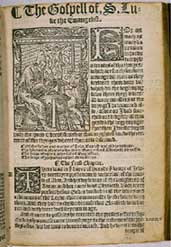 Despite the boldness of his dissent, Luther's "heresy" was not ended in the usual fiery fashion, with an execution at the stake. Instead, aided by very powerful friends, the now-outlaw Martin Luther escaped to create yet another large thorn in the side of the Church -- his own German language translation of the New Testament. And in fact, he would eventually publish an entire German language version of the Bible, minus the offending seven books.
Despite the boldness of his dissent, Luther's "heresy" was not ended in the usual fiery fashion, with an execution at the stake. Instead, aided by very powerful friends, the now-outlaw Martin Luther escaped to create yet another large thorn in the side of the Church -- his own German language translation of the New Testament. And in fact, he would eventually publish an entire German language version of the Bible, minus the offending seven books.